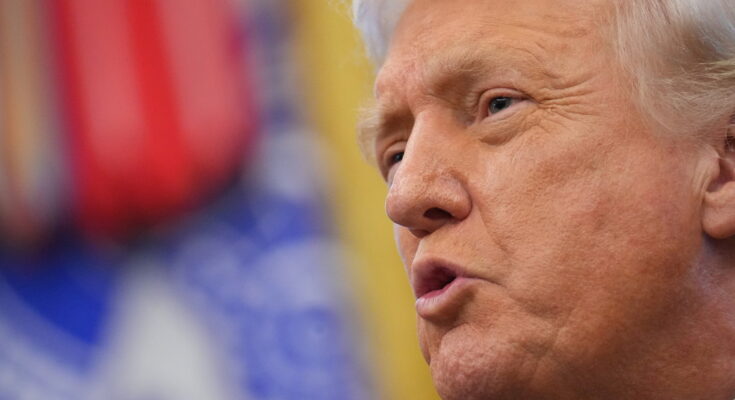Photo: La Presse
Angela Barbieri
President Donald Trump signed an executive order that retroactively reduced tariffs on several agricultural products such as coffee, beef, tomatoes and bananas. This move by the White House comes amid great pressure due to the high cost of living. The US President has focused on tariffs to stimulate domestic production and the US economy. However, recent regional elections have highlighted economic issues as a priority. Last April, Trump imposed so-called “reciprocal” tariffs of at least 10% on most products imported into his country, and tariffs also applied to agricultural raw materials. “We’re just cutting back a little on certain foods like coffee,” the US president said yesterday aboard Air Force One to Florida hours after the announcement. Asked whether tariffs contributed to rising consumer prices,
Trump acknowledged: “I would say, in some cases, it could happen.” “But most of them are supported by other countries,” he added. Trump’s sudden withdrawal of his tariffs on many food products came after clear signals of voters’ concerns about the cost of living emerged from polls, along with Democratic gains. The news coming from abroad notes the reaction of Illycaffè CEO, Cristina Scocchia: “We welcome this news, which represents a positive injection and opportunity for strengthening in a leading market at global level. This is a sign of détente that encourages investment and creates new opportunities for growth, increasing margins and accelerating development opportunities in the United States.” While waiting for the American government’s official decision, Scocchia told LaPresse in the last few hours: “It will take a long time to feel the impact of a possible reduction in import duties on prices, because we all buy coffee 6-9 months before it is roasted, packaged and marketed.” “The historical average between 2015 and 2021, for six years, is between 100 and 130 cents per pound, almost a commodity with a fixed price – Scocchia underlined.
Now it costs three times as much and unfortunately over the past few months.” In 2024 the average price went from 100-130 cents per pound to 280-300 cents and now we are at 400. The companies, explained the CEO of Illycaffè, “have been buying and buying in the last few weeks at prices above 400 cents per pound. “Even if tariff cuts occur in the coming weeks, it is clear the impact on the market will only be visible in the second half of 2026,” he added. From the end consumer’s point of view, compared to 2021, the price of a cup of coffee in a bar has increased by 20%, reaching 1.22 euros compared to one euro in 2021. “Over these two years, the price of coffee has reached a value that has nothing to do with the real economy. It is no longer determined by nature, but mainly determined by speculation”, said the top manager. With price tensions lingering, companies are seeing “very significant margin compression,” he said. “We – explains Scocchia – have decided to pass on about a third of the increase in raw material costs to the final price and accept a contraction of our margins for the remaining two thirds: this seems to be the right approach for us”. Meanwhile – continues the CEO – “we continue to invest, confident that this perfect storm will end. And we want the company to be in the strongest competitive position at that time”. Investment also abroad.
“We are evaluating – says Scocchia – all possibilities, starting from building a factory from scratch that produces some products aimed at the local market. I would like to underline that there is no intention to transfer anything of what we produce in Trieste to the United States. The second possibility, a solution that would reduce the time, is to create a partnership with a local copacker that would allow us to guarantee this production on site. At the end of the year or early next year we will be able to announce our decision”. “Of course beyond import duties, the United States, our second market after Italy, where we have 20% of our turnover, is entitled to some local production”, concludes Scocchia, who reiterates his willingness to invest even after the official announcement of the cut in import duties. “A third of all coffee imported from the United States comes from Brazil and that’s a lot. – illycaffè CEO also explained to LaPresse – Today American coffee producers clearly do not want to import coffee paying 50% import duties at a cost beyond any financial logic. So it is true that in the United States the supply is lower than the demand, but this is due to tariffs, because if we look at ‘nature’, as I define it, then the total tons available at the global level are higher than the demand, so there is no price excuse it’s getting so high.” Brazilian Vice President Geraldo Alckmin said today that Brazilian products exported to the United States, including coffee, beef and tropical fruit, would be subject to tariffs of 40 percent. The impact arising from tariff cuts, Alckmin considers too small: “We will continue to work to reduce them further”, he said.


